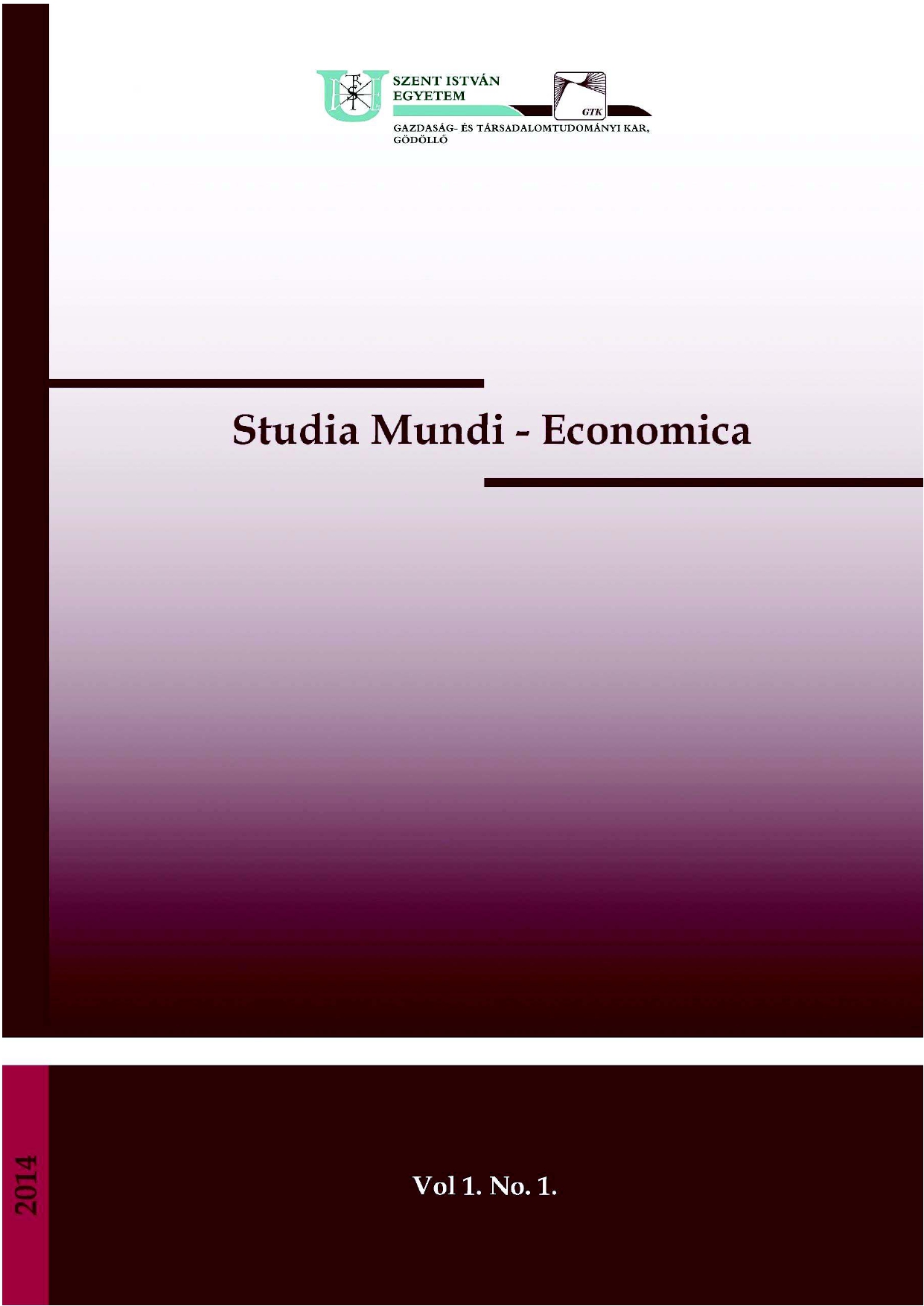Youths and agribusiness development in Kenya
DOI:
https://doi.org/10.18531/Studia.Mundi.2014.01.01.70-78Abstract
In many parts of the world, agriculture has been left for the old people and illiterate men and women in the rural areas. Unfortunately, these people view agribusiness with a lot of suspicion. For them, agribusiness is synonymous with big business/ capital, transnational corporations, globalization, international capital, export crops and large-scale plantations. More often than not, these are seen to culminate into exploitation of local people and resources.
Adoption of new technology, inputs and engagement with new markets are critical for the enhancement of agricultural productivity in Kenya. With the new free primary and secondary education in Kenya, a higher population of youths are literate hence able to adopt new technology and engage with the new markets in the agricultural industry. Since agribusiness is all about innovation in line with value addition, youths are privileged to have technological, mental and physical capacity to think and execute accordingly.
When projecting into the future of agribusiness in Kenya, the youths are inevitably vital. It is also undoubted fact that the critical role played by agribusiness in agri-food sector requires high level of flexibility and dynamism among the people involved.
This vibrant agriculture will lead to fairly adequate availability of employment opportunities within the sector. Specifically, jobs will move from informal to formal, small scale organizations to formal and large scale; from artisan to more industrial processing; from wet market to store based retail and small market centers will grow to towns and cities.
The main objective of this research is to find out the diverse potentials among the youths that are essential for agribusiness development in Kenya. It will focus on knowledge or literacy levels among the youths; ability to think or innovate, training potentials and health conditions among others. It will also look into the physical resources available at their disposal e.g land size, shelter, livestock, capital etc. We will also go an extra mile to find various challenges that discourages youths from engaging in agribusiness ventures. The results of these findings will enable us to conclude whether the youths are indeed essential for the agribusiness development in Kenya or not.
Literaturhinweise
Njojo K. S. (2010). Youth Fact Book, Infinite Possibility or Definite Disaster? Institute of Economic Affairs, Nairobi, Kenya.
United Nations Development Programme (1999). Kenya Human Development Report.
P. Njenga, F. Mugo and R. Opiyo, 2011, Youth and Women Empowerment through Agriculture in Kenya.
Agriculture Sector Development Forum report, 2012, Nairobi, Youth for Agriculture.
Government of Kenya. (2010). The Agricultural Sector Development Strategy 2010-2020, Government printers, Nairobi Kenya.
Government of Kenya, (2011). Economic Survey 2011. Kenya National Bureau of Statistics. Nairobi, Kenya.
Government of Kenya. 2007. Kenya Vision 2030: A Globally Competitive and Prosperous Kenya. Government Printers. Nairobi , Kenya.
Government of Kenya, 2012: National Agribusiness Development Strategy, 2012.
Kenya Rural Youth Livelihood Strategies Programme, 2006: Youth Employment Summit, Nairobi , Kenya.
W. Kinuthia (2009), Educational Development in Kenya and the role of information and Communication Technology, Georgia State University, USA.
Government of Kenya, 2013, Kenya Population Situation Analysis, 2013
Ministry of Agriculture and Deutsche Gesellschaft für Internationale, 2013, Gender Analysis for GIZ Agricultural Program, Nairobi, Kenya.
Action Aid & CARE. (2012). What works for Women: Proven approaches for empowering women smallholders and achieving food security. Retrieved from http://www.actionaidusa.org/publications/
Bill and Melinda Gates Foundation. (2012). Women in agriculture: If we invest in them, we can feed the world. Seattle, WA: Author. Retrieved November 17, 2012, from http://www.gatesfoundation.org/infographics/Pages/women-in-agriculture-info.aspx.
African Union Commission and GIZ. (2012). Making finance work for Africa. Policy brief on agricultural finance in Africa.
Blackden, M., & Wodon, Q. (2006). Gender, time use, and poverty in Sub-Saharan Africa. World Bank Working Paper No.73. Washington, DC: World Bank. DOI: http://dx.doi.org/10.1596/978-0-8213-6561-8
Agricultural Development Sector forum, 2012: Moving Towards Agribusiness for a Globally Competitive Agricultural Sector.
World Bank. 2013. “Growing Africa: Unlocking the Potential of Agribusiness.” AFTFP/AFTAI Report. World Bank, Washington, DC.
World Bank. 2011b. “Kenya Informal Settlements Improvement Project.” Project appraisal document. World Bank, Washington, DC.
Kenya National Census Report, 2009.
Population Survey, World Bank Report, 2009
Agri Village, Village Enterprise Report, 2011. Kenya.
Youth Development agenda report, 2012, Ministry of Youth Affairs and Sports, Kenya.
Ministry of Youth Affairs Sports, 2011: Status of youth Employment in Kenya, Conference report, 2011, Nairobi, Kenya.
AfDB, UNECA, FAO, African Union., (2011).: Improving Statistics for Food Security, Sustainable Agriculture, and Rural Development — An Action Plan for Africa 2011-2015. Retrieved from http://www.fao.org/fileadmin/templates/ess/documents/meetings_and_workshops/Resource_Partners_Oct2011/AfDB_Agriculture_long_web_PrintVersion_Final_04July2011.pdf
Hortfresh Journal,2012: Amiran Takes the Agribusiness Revolution to Kenya’s Youth.
C. Ibadhu and S. Thiaine, 2013,Realizing Equal Opportunities among Youth Groups in Agribusiness Sector in Accessing Government Financial Credit Facilities. Meru University of Science and Technology, Kenya. DOI: http://dx.doi.org/10.9790/487x-1520412
E. Mabaya, ; C.D. Ralph.; and M. Bandama, (2010), Current State of agribusiness Training in Africa.
Maguire, C.J. 2000, “Agricultural Education in Africa: Managing Change,” Workshop 2000, Ghana, The World Bank, Washington, DC.
National Food and Agribusiness Management Education Commission 2006, Agribusiness Food and Agribusiness Management Education: Future Directions, Purdue University, Kansas State.
Downloads
Veröffentlicht
Ausgabe
Rubrik
Lizenz
Copyright (c) 2014 Martin Abwao

Dieses Werk steht unter der Lizenz Creative Commons Namensnennung - Nicht-kommerziell - Keine Bearbeitungen 4.0 International.
A folyóirat Open Access (Gold). Cikkeire a Creative Commons 4.0 standard licenc alábbi típusa vonatkozik: CC-BY-NC-ND-4.0. Ennek értelmében a mű szabadon másolható, terjeszthető, bemutatható és előadható, azonban nem használható fel kereskedelmi célokra (NC), továbbá nem módosítható és nem készíthető belőle átdolgozás, származékos mű (ND). A licenc alapján a szerző vagy a jogosult által meghatározott módon fel kell tüntetni a szerző nevét és a szerzői mű címét (BY).






